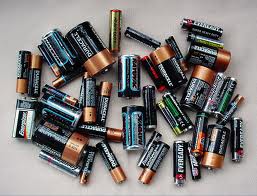For many years, I have stored alkaline and carbon zinc batteries in the refrigerator believing that it extended their storage life. Recently I have come across new information that disagrees with this method.
Several of the battery manufactures are now stating that storage in a refrigerator can actually shorten the life of some batteries. This is because of changes made in the formulation of the batteries.
On the Duracell site they state, “Do not refrigerate Duracell batteries, this will not make them last longer.”
The following is from Eveready’s home page.
Should I store carbon zinc batteries in the refrigerator?
Storing batteries in refrigerators or freezers is not required or recommended for batteries produced today. In fact, cold temperature storage can harm batteries. To maximize performance and shelf life, store batteries at normal room temperatures with moderate humidity levels.
Should I store alkaline batteries in the refrigerator?
Storing batteries in refrigerators or freezers is not required or recommended for batteries produced today. In fact, cold temperature storage can harm batteries. To maximize performance and shelf life, store batteries at normal room temperatures with moderate humidity levels.
The Rayovac site states, “Store batteries in a cool, dry location. Remember, batteries are like any other chemical system. Heat will accelerate the chemical reaction and shorten cell life. Avoid storing batteries or battery-operated devices in extremely warm places or other temperature extremes”.
The following are some tips to help you get the best life from your batteries.
- Before you throw away batteries that you think are dead, wait. Check to see if they have been inserted correctly, and follow the instructions on your device, making sure that the positive (+) and negative (-) terminals of each battery are aligned properly. Also, check to see that the terminals are clean. When in doubt, clean the terminals with a coarse cloth or pencil eraser.
- Batteries cannot deliver much power when they are cold. You may find that the flashlight kept in your car in the middle of winter casts a faint beam. Let the batteries warm up to normal temperature, and try them again before you decide to replace the batteries.
- Don’t mix new and old batteries. This draws more power from the new battery, thus shortening its life.
- DON’T store batteries or battery-powered devices in hot places — elevated temperatures can lead to capacity loss, leakage or rupture.
From everything that I can find I believe you will get a good storage life from your batteries if you store them in moderate temperatures and a dry area.
If you buy batteries in bulk from Costco or similar suppliers look at the packaging, they have a use by date on them. Check your dates, they should show a life of from 5 to 7 years.
Howard


You trust those who stand to gain by reducing the life of your batteries to tell you how to extend their life?
Is there any credible data independent of battery manufacturers?
It’s been a long time since college chemistry, but the general rule-of-thumb is that chemical reactions slow down at lower temperatures, so all else being equal, I don’t see how keeping batteries cold (until you need them) can possibly reduce their lifetime. This article does not explain the “why” of not keeping them in cold storage.
Even though I only quoted the manufacturers, I did check with other sources. The reason that it is unnecessary to store them in refrigerators is because of the new changes in formulation and the effects of moisture and humidity. The combined effects of moisture and humidity offset any storage life gained by storing them under refrigeration.
Howard
I can vouch for the shorter life. During warm weather I can get a set of batteries (2x D Cells) at work to last 3-4 days. During winter the life dropped to 1/2- 1 1/2 days. These were used till they either blinked out or were so low the flashlight was only good as a marker and beam wasn’t good past 3 feet. I use a 2-D Cell Maglight.
On cars and trucks you have most battery failures during late Fall and early Winter when the temps drop below 50 degrees F. The cold saps the life out of batteries that have gotten weak.
In cold temperatures, keep your batteries on the inside pocket of your jacket or sweater along with small flashlights etc. This will minimize the poor performance. Just make sure that your emergency jacket has decent sized inside pockets- for two things 1. Batteries, 2. Water- keeping a small bottle next to your body will keep it from freezing. Also, if you are doing a lot of hard work you can slowly refill the bottle with snow or ice (if it is safe). This is not adviseable when sedentary, but if you are moving or working it is refreshing and in some cases keeps you from overheating in your warm clothes.
I borrowed a battery from a friend, she kept them in her fridg so I stuck
mine in my fridg also. tried it out today. And none of them work even after
time to thaw. Never had problems before with batterys I kept in a plastic sack, in the desk drawer.. Now I am truly pissed, my supply is ruined. I read that alkaline is not to be be near tc cold or moisture. Well dummy me,
If something works do not fix it..You may destroy it.. No more cold -dead-
batterys for me. And my friend is not the smartest kid on the block either ~! Now I got to buy batterys.
Since, rice can save a wet phone or e-cig. Wouldn’t rice preserve a battery from moisture and other unknown conditions, therefore giving it a longer shelf life? I thought about Food grade Diatomaceous Earth, but I know it is naturally negative charged, so it probably wouldn’t work. F.G. Diatomaceous Earth and Rice have similar qualities with moisture and odors.